
International Journal of Chemical Engineering
Scope & Guideline
Connecting researchers to shape the future of chemistry.
Introduction
Aims and Scopes
- Biochemical Engineering:
Research on the production and optimization of biofuels and bioproducts from biomass, including microbial processes and the use of enzymes. - Thermal and Fluid Dynamics:
Studies involving heat transfer, fluid dynamics, and the optimization of energy systems, particularly in industrial applications. - Catalysis and Reaction Engineering:
Exploration of catalysts and reaction mechanisms for chemical processes, including novel synthesis methods and optimization of catalytic performances. - Environmental Chemical Engineering:
Research focused on the treatment of wastewater, pollution control, and sustainable practices in chemical engineering. - Materials Science and Engineering:
Investigations into the properties and applications of materials, including nanocomposites and polymers, in chemical processes. - Process Optimization and Modeling:
Development of mathematical models and optimization techniques for improving chemical processes and systems.
Trending and Emerging
- Biomass Utilization and Bioenergy:
There is an increasing focus on the conversion of biomass into biofuels and other valuable products, showcasing the industry's response to the demand for renewable energy sources. - Nanotechnology and Advanced Materials:
Research on nanomaterials and their applications in catalysis, adsorption, and environmental remediation is gaining traction, reflecting a broader trend towards miniaturization and enhanced material performance. - Artificial Intelligence and Machine Learning in Chemical Engineering:
The integration of AI and machine learning techniques to optimize chemical processes and predict material properties is becoming a significant area of interest, revolutionizing traditional approaches. - Sustainable Chemical Processes:
Emerging studies emphasize the development of sustainable chemical processes, including green chemistry practices that minimize environmental impact and improve resource efficiency. - Electrochemical Processes:
The investigation of electrochemical methods for energy storage and conversion, such as fuel cells and batteries, is trending as the demand for clean energy solutions continues to rise.
Declining or Waning
- Traditional Chemical Synthesis:
Research on conventional chemical synthesis methods has decreased as newer, more efficient techniques and catalysts are developed, leading to a shift towards greener and more sustainable methodologies. - Basic Thermodynamics:
While still important, the focus on basic thermodynamics in isolation has waned as interdisciplinary approaches that incorporate computational modeling and machine learning become more prevalent. - Static Process Analysis:
The emphasis on static analysis of chemical processes is declining in favor of dynamic modeling and real-time process optimization, reflecting the industry's move towards more adaptive systems. - Single-Use Plastics:
Research specifically targeting the use and recycling of single-use plastics has decreased, likely due to the growing focus on biodegradable alternatives and sustainable materials. - Conventional Wastewater Treatment Methods:
Traditional methods of wastewater treatment are being overshadowed by innovative technologies such as membrane bioreactors and advanced oxidation processes.
Similar Journals

THEORETICAL FOUNDATIONS OF CHEMICAL ENGINEERING
Fostering Scholarly Communication in Chemical SciencesTHEORETICAL FOUNDATIONS OF CHEMICAL ENGINEERING is an esteemed academic journal published by PLEIADES PUBLISHING INC, dedicated to advancing the field of chemical engineering and chemistry through rigorous theoretical discourse and scholarly communication. With a history of publication dating back to 1974, the journal has been a vital resource for researchers and professionals, contributing to the foundation of knowledge in this multidisciplinary domain. Although it does not offer open-access options, it remains an essential platform for innovative research, boasting a 2023 ranking in the Q3 quartile for both Chemical Engineering and General Chemistry categories. The journal is indexed in Scopus, where it ranks #210 out of 273 in Chemical Engineering and #317 out of 408 in Chemistry, emphasizing its growing relevance within the scholarly community. Researchers, educators, and students alike can benefit from the insights and findings shared within its pages, making it a critical venue for those seeking to enhance their expertise in theoretical chemical engineering.

Engineering Review
Igniting collaboration in the engineering community.Engineering Review is a prominent academic journal published by the University of Rijeka, Faculty of Engineering in Croatia. As an emerging outlet in the field of engineering, the journal has been providing a platform for interdisciplinary research since its inception in 2011, with a commitment to disseminating high-quality studies up to the horizon of 2024. Although currently categorized as Q4 in the Engineering (miscellaneous) section and ranking 242 out of 307 in General Engineering per Scopus metrics, the journal aims to bolster its impact and reach within the engineering community. With a focus on innovative approaches and practical applications in various engineering disciplines, Engineering Review invites contributions from researchers, professionals, and students alike, fostering a collaborative environment for the advancement of engineering research in a global context. While it is not an open-access journal at this time, it remains a vital resource for those engaged in cutting-edge engineering endeavors.
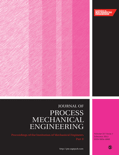
PROCEEDINGS OF THE INSTITUTION OF MECHANICAL ENGINEERS PART E-JOURNAL OF PROCESS MECHANICAL ENGINEERING
Transforming Ideas into Engineering ExcellencePROCEEDINGS OF THE INSTITUTION OF MECHANICAL ENGINEERS PART E - JOURNAL OF PROCESS MECHANICAL ENGINEERING is a leading peer-reviewed journal published by SAGE Publications Ltd, dedicated to the field of mechanical and process engineering. With a strong emphasis on the latest research and developments, this journal covers a wide range of topics that are vital for advancing the understanding and application of mechanical processes in engineering. Holding an impressive Q2 ranking in both Industrial and Manufacturing Engineering and Mechanical Engineering categories for 2023, it promotes high-quality scholarly articles that are instrumental for researchers and professionals alike. The journal's historical range from 1989 to 2024 showcases its commitment to consistently delivering vital insights to the engineering community, making it an essential resource for those seeking to stay at the forefront of the discipline. Although it does not currently offer open access options, the impact factor and relevance of the journal ensure that it remains a valuable platform for disseminating significant findings in the field.
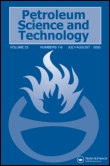
PETROLEUM SCIENCE AND TECHNOLOGY
Advancing the frontiers of petroleum research.PETROLEUM SCIENCE AND TECHNOLOGY, published by Taylor & Francis Inc, is a pivotal journal dedicated to advancing the multidisciplinary field of petroleum engineering and related technologies. With an ISSN of 1091-6466 and an E-ISSN of 1532-2459, this journal serves as a vital platform for disseminating research in areas ranging from geotechnical engineering to energy technology. As of 2023, it is recognized in the Q3 quartile across several categories, including Chemical Engineering and Fuel Technology, signifying its respectable standing within the academic community. With a convergence timeline from 1997 to 2024, the journal continuously addresses crucial issues in the energy sector, making it essential reading for researchers, industry professionals, and policy-makers alike. Although not an open access journal, its rigorous peer-reviewed articles contribute significantly to the advancement of knowledge and innovation within these fields, reflecting the journal's commitment to promoting scientific understanding and practical applications.

RUSSIAN JOURNAL OF APPLIED CHEMISTRY
Pioneering Research at the Intersection of Chemistry and EngineeringRUSSIAN JOURNAL OF APPLIED CHEMISTRY, published by PLEIADES PUBLISHING INC, serves as a pivotal platform for advancing knowledge in the fields of chemical engineering and general chemistry. With an ISSN of 1070-4272 and an E-ISSN of 1608-3296, this journal has been in continuous publication since 1995 and is set to continue until 2024. Although it operates without an open access model, researchers can access a wealth of innovative research findings, critical reviews, and insightful discussions that reflect the current trends and challenges in applied chemistry. Its rankings place it in Q3 quartiles for both Chemical Engineering and Chemistry as of 2023, indicating its emerging influence within these disciplines. The Scopus rankings further highlight its relevance, positioning it in the lower percentiles, suggesting a fertile ground for researchers aiming to elevate the field. Engaging with this journal can enrich academic and professional understanding, making it an essential resource for anyone dedicated to furthering their expertise in applied chemistry.
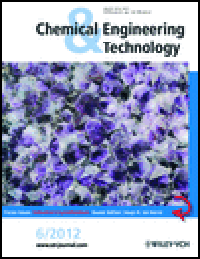
CHEMICAL ENGINEERING & TECHNOLOGY
Elevating Knowledge in Chemical Engineering and BeyondChemical Engineering & Technology is a prestigious journal published by Wiley-VCH Verlag GmbH, focusing on the evolving field of chemical engineering and its related disciplines. With an ISSN of 0930-7516 and E-ISSN of 1521-4125, the journal has established a robust platform for researchers and practitioners to share pioneering studies and innovative technologies within the field. Classified in the second quartile (Q2) across multiple categories such as Chemical Engineering, Chemistry, and Industrial and Manufacturing Engineering, it holds an impressive rank in the Scopus database, indicating its significant contribution to the academic community. The journal's commitment to advancing knowledge is reflected in its extensive convergence of research from 1987 to 2024, providing a comprehensive archive of scholarly work. Researchers, professionals, and students benefit from the latest insights and findings, enriching the dialogue around chemical processes and methodologies. Though it operates under a traditional subscription model, the accessibility of this journal is crucial for those engaged in both theoretical and applied aspects of chemical engineering.

Applied Chemistry for Engineering
Advancing Knowledge for Real-World ApplicationsApplied Chemistry for Engineering, published by the Korean Society of Industrial and Engineering Chemistry, is a vital resource for researchers and professionals engaged in the realms of chemical engineering and applied chemistry. With an ISSN of 1225-0112 and an E-ISSN of 1228-4505, this journal serves as a platform for innovative research that spans diverse applications within these fields. Although currently not classified under open access, it provides critical insights and advancements to its audience, contributing to the ongoing discourse in the industry. The journal's significance is underscored by its rankings in Scopus, where it resides in the Q4 category for both Chemical Engineering and Chemistry, evidencing its commitment to publishing relevant studies despite its emerging status. As it continues to grow through the converged years from 2007 to 2024, Applied Chemistry for Engineering aims to bridge the gap between theoretical research and practical engineering solutions, making it an essential tool for students, researchers, and professionals alike.
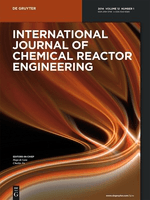
International Journal of Chemical Reactor Engineering
Pioneering Research in Reactor Engineering ExcellenceInternational Journal of Chemical Reactor Engineering, published by WALTER DE GRUYTER GMBH, serves as a vital platform for advancing knowledge in the field of chemical engineering, specifically focusing on reactor engineering. The journal, recognized by its ISSN 2194-5748 and E-ISSN 1542-6580, has maintained its commitment to quality research since its inception in 2002 and spans converged years through 2024. With a respectable Q3 ranking in the miscellaneous category of Chemical Engineering and a current Scopus rank of 158/273, it represents a significant resource for researchers aiming to publish innovative findings and practical applications. Although it operates under a subscription model, it still attracts attention for its rigorous standards and insightful contributions to the field. The journal’s focus on the interdisciplinary aspects of chemical reactor design, optimization, and safety underscores its importance in driving forward the technical and theoretical boundaries of chemical engineering. Addressed from Genthiner Strasse 13, D-10785 Berlin, Germany, the International Journal of Chemical Reactor Engineering is a must-read for professionals and scholars dedicated to pushing the frontiers of chemical reaction technologies.
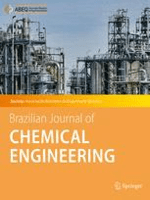
BRAZILIAN JOURNAL OF CHEMICAL ENGINEERING
Pioneering Research for Tomorrow's ChallengesThe Brazilian Journal of Chemical Engineering (ISSN: 0104-6632, E-ISSN: 1678-4383), published by Springer Heidelberg, stands as a prominent open-access journal dedicated to disseminating innovative research and advancements in chemical engineering since its inception in 1997. With a commitment to enhancing knowledge exchange within the field, this journal is indexed in Scopus, earning a respectable Q3 rank in the category of General Chemical Engineering as of 2023. It provides a platform for researchers, professionals, and students to explore a diverse range of topics, fostering collaboration and innovation from its base in Brazil. The journal has converged its operations from 1995 and will continue to push the boundaries of chemical engineering research until 2024 and beyond. As a critical resource for up-to-date methodologies and emerging trends, the Brazilian Journal of Chemical Engineering is essential for those aiming to make impactful contributions in this dynamic and evolving field.
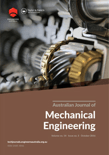
Australian Journal of Mechanical Engineering
Bridging Theory and Practice in Mechanical Engineering Excellence.The Australian Journal of Mechanical Engineering is a distinguished publication in the realm of mechanical engineering, dedicated to advancing the knowledge and application of engineering principles within the industry. Published by TAYLOR & FRANCIS LTD in the United Kingdom, this journal has been integral to the field since its inception, featuring a range of peer-reviewed research articles, reviews, and technical notes that collectively aim to bridge theoretical research with practical applications. With an impressive Scopus ranking of #271 out of 672 in Mechanical Engineering, positioning it within the 59th percentile, the journal continues to uphold rigorous academic standards, currently occupying Q3 in the 2023 quartile rankings. Researchers, professionals, and students alike will benefit from its comprehensive coverage and insightful contributions, providing a vital platform for knowledge exchange and innovation in mechanical engineering.